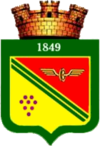Basarabeasca
| Basarabeasca | ||
|---|---|---|
|
||
| Location within Moldova | ||
| Coordinates: 46°20′N 28°58′E / 46.333°N 28.967°E | ||
| Country |
|
|
| County | Basarabeasca District | |
| Government | ||
| • Mayor | Vasili Filipov | |
| Population (2014) | ||
| • Total | 8,471 | |
| Time zone | EET (UTC+2) | |
| • Summer (DST) | EEST (UTC+3) | |
| Climate | Cfb | |
Coordinates: 46°20′N 28°58′E / 46.333°N 28.967°E
Basarabeasca (Romanian pronunciation: [basaraˈbe̯aska], Moldovan Cyrillic and Russian: Басарабяска; Bulgarian: Бесарабка, Besarabka) is a city in Moldova. It is the capital of Basarabeasca District.
The city, formerly an urban-type settlement, is located on the border with Ukraine. It is 94 km to the south of the national capital Chişinău, 25 km from Cimislia, and 25 km from Comrat. The river Cogilnic flows through the city from northwest to southeast, continuing on to the Black Sea. The main populated areas are in the lowlands. These are effectively divided into several areas, such as Romanovka and Flemynda.
A Jewish settlement at the site of Basarabeasca was started in 1846; it was originally named Romanovka in honor of the Russian imperial family of Romanovs. In 1859 there were 86 resident Jewish families who worked the land, 263 men and 249 women. They owned 1750 desyatinas of farmland. At the time of the abolition of Jewish land tenure in 1866, 57 families were occupied in farming – 209 men and 183 women. They shifted primarily to the business of wine production, working in its sales and trade. In order to improve the lot of the colonists, the Zemstvo of Bender instituted market days weekly on Wednesday. This was done at the request of Captain Fyodor Oleynikov on October 29, 1876.
...
Wikipedia


